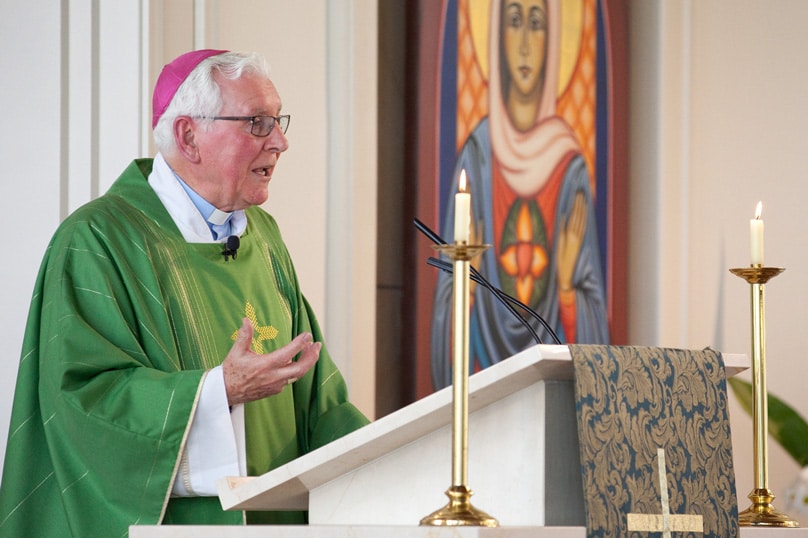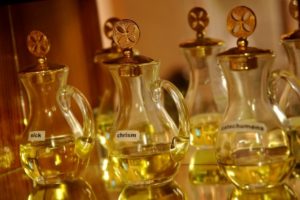
As we gather for the Mass of the Holy Oils this year, as every year, we focus on Jesus Christ our Saviour and eternal High Priest, in whose priesthood you and I share as the baptised and as the ordained.
Jesus Christ acts through the Sacraments of the Church to bring us grace: the grace of healing through the Oil for the Sick; the grace of belonging through the Oil of Catechumens; and through Chrism for the completion of initiation in Confirmation. Chrism is also used for dedicating churches and consecrating priests and bishops.
This unique Chrism Mass in each diocese is a truly diocesan event, held in our mother Church, the Cathedral, so named because of the Bishop’s Cathedra (or chair) representing my office of teaching, sanctifying and pastoring the people of God through you, our collaborating clergy, our religious and our lay people, all of us being co-responsible for the Body of Christ, the local church of the Diocese of Wollongong.
The book of Revelation calls Jesus the Alpha and the Omega, the first and last letters of the Greek alphabet. Jesus is the A to Z: that is, the beginning and the end of everything. So Jesus is the fulfilment of the prophet Isaiah’s words about Good News. Jesus has come to bring Good News to the poor, liberty to captives, new sight to the blind, to set the downtrodden free and to proclaim a holy year of God’s favour that will never end. It had its beginning in the life of Jesus and was passed onto his Church where this “Year of Favour” is still being proclaimed and lived.
If what Jesus says here, as he reads Isaiah and makes the prophet’s words his own; if what Jesus says about being Good News is not at the centre of the Church’s mission – at the centre of our parish ministry, at the centre of the way we live – then we have drifted from the centre of the mission and ministry of Jesus. The whole Alpha movement that we are promoting in the Diocese is about getting to the basics of our own faith, a personal encounter with Jesus who died and rose again in order to save us and be the source of grace and mission through the forgiveness of our sins.
As is proper for the one reading from the scroll in the synagogue, all eyes are fixed on Jesus. The text Jesus reads speaks of the coming of the Messiah. Messiah, in Hebrew, means “the anointed one”. With the Holy Spirit upon him, as the “anointed of the Lord”, Jesus proclaim show he will fulfil his mission as the Messiah by bringing hope to those who have lost hope. The life story of Jesus will be dominated by this mission. Throughout the Gospel of Luke, Good News is proclaimed to the poor, to captives like people with disabilities, such as the blind, the deaf, the lame and the downtrodden (even to the thief on the Cross.) Hope is vital to life and as Christians you and I deal in hope, because Jesus conquered sin and death by dying on the Cross, and rising from the grave.
The only way any of us, clergy, religious or laity, can preach or be an example of Jesus’ Good News with real power and meaning, is in striving to be authentic as Jesus was authentic.
It is significant that in the beginning of his public ministry Jesus came to Nazareth, where he had been brought up, and went into the synagogue on the Sabbath day as he usually did. Jesus had nothing in his life to hide. He did not have to go to a faraway place where people didn’t know him in case he may be challenged to practise what he preached. These people knew Jesus from childhood. He was totally authentic. He practised what he preached. He is Good News.
This is our Saviour with whom we, the Baptised, the Consecrated Religious, and the Ordained, are in a personal relationship of love and dedication as his disciples. Yet I feel a sadness this year, because I see Jesus and our Christian faith, which we love and cherish, attacked and demeaned in the world today.
Some of this we have done to ourselves: our need to repent and change the Church culture that grew the sexual abuse scandal and seemed to protect the abusers and denied the victims, because we didn’t really listen, we didn’t want to believe it. People who have been abused can be scared of talking to the Church and people in the Church can be scared of the people who have been abused. It may be time to revisit how our local faith community is travelling with the abuse issue.

It can be difficult to process what the Royal Commission is saying about us and about what we have done to victims, and difficult to comprehend the credibility we have lost with victims and as a church. We now have to demonstrate by our actions, in practical ways, that it will no longer be “business as usual”. These are crucial questions for us clergy personally, and they are crucial questions for the future of the Church as a whole. I am very grateful for the work you, our clergy, are doing for our parishes and communities to ensure a culture of safety for our children and vulnerable people.
My sadness also extends to the deliberate genocide against Christians by Islamic State and in Africa. Fundamentalist Islamists are intensifying their persecution of Christians globally. The shocking bombing of Coptic Christian churches in Egypt on Palm Sunday echoes the same ruthless murder of Christians in the Coptic Cathedral of Cairo last Christmas. I even wonder if the Christian heritage in France, Belgium, England and now Sweden is also part of ISIS genocide, even though the West is reluctant now to identify itself as Christian, as if we have forgotten who we are – that all the rights, the democracy, the religious pluralism that we take for granted, are part of an historic global story of Christian social progress.
In last weekend’s Sunday Telegraph newspaper (9 April2017), journalist Miranda Devine broke the media silence about religiously motivated attacks on Christians by Islamic fundamentalists in Western Sydney. Miranda described how a 30-year-old Greek Orthodox Christian man with his girlfriend were on a train between Campsie and Bankstown. He was wearing an obvious cross on a chain around his neck. Four young men of Middle Eastern appearance attacked him physically, bashed him, ripped the crucifix from its chain and stomped on it, blaspheming Jesus and referring to Allah. A Baptist Minister from Western Sydney said this was the fourth Christian to complain to him of a religiously motivated attack in the past six months by extremist fundamentalists. Yesterday, 11 April 2017, journalist Tim Stanley in the Sydney Morning Herald wrote: “It’s time to acknowledge the war on Christianity.”
You may also have noticed how it became politically incorrect to give any preference to persecuted Syrian or Iraqi Christians among our government’s refugee intake for settlement in Australia. There seemed an almost wilful ignorance of Islamic State’s deliberate genocide of Christians. When Christians are killed for being Christians, politicians overlook it and public interest fades. More than half of Iraqi Christians have died or fled. Up to one million Christian Syrians are now refugees.
Please note I am talking about militant fundamentalists. Sadly we also have militant fundamentalist Christians. All extremes are wrong! You may know of the Illawarra People for Peace Movement initiated here by Fr Ron Peters involving Muslims, Uniting Church and Catholic and other citizens. It is an organisation to help us get to know one another and work together in respect for the dignity of every person and for the common good of our community; a willingness to encourage the moderate and authentic voices within Islam. This followed an earlier outreach some years ago by the Knights of the Southern Cross, with Turkish Muslims in Cringila. There has also been our local connection and involvement with the Affinity Intercultural Foundation.
Christians in Australia are also increasingly fair game by the militant lobbies such as those who harassed and intimidated Mass goers at St Mary’s Cathedral to disrupt the Mass and prayerful procession on 24 March 2017 – the Day of the Unborn Child – because they want to protect the right to abortion from public opinion.
There seems no religious freedom for expressing an alternative opinion or being public about one’s faith.
Holy Week asks us to focus on the persecution and crucifixion of the world’s first Christian –Jesus himself who promised his followers they would not be free of persecution.
In his Last Supper discourse, Jesus told his disciples:
“A servant is no greater than the Master. If they persecuted me, they will persecute you too.” (John 15:20)
In the Sermon on the Mount Jesus said: “Happy are you when people abuse you and persecute you and speak all kinds of calumny against you on my account. Rejoice and be glad for your reward will be great in heaven.” (Matthew 5:11)
In spite of what is happening, as Archbishop Mark Coleridge says: “This is not the time to circle the wagons”. Rather this is the time to refocus on Jesus Christ, our eternal High Priest, the faithful witness, the firstborn from the dead, the ruler of the kings of the earth. Jesus loves us more than you and I could ever imagine. He has washed away our sins with his blood.
In spite of all that is going on around us, Jesus called you and me to be authentic Gospel Good News wherever we are, confident to be his disciples and witnesses because of the blessings and divine support we have experienced in the past.
May the Hope of the Risen Lord be our encouragement this Easter.
Yours in Christ,
Bishop Peter Ingham
Bishop of Wollongong
